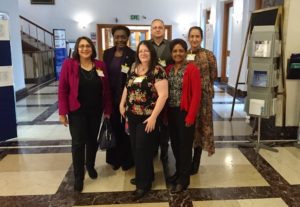 Patients as educators [1] are vital for organisational development. Their narratives of patient experience can connect patients, users, and healthcare providers to their common humanity. The Francis report (2013) [2] wanted healthcare organisations to be open, honest, transparent, and responsive to the voices of patients and staff.
Patients as educators [1] are vital for organisational development. Their narratives of patient experience can connect patients, users, and healthcare providers to their common humanity. The Francis report (2013) [2] wanted healthcare organisations to be open, honest, transparent, and responsive to the voices of patients and staff.
This type of attitude builds progressive, healthier organisations that value compassion, empathy, and an institutional awareness of human rights in healthcare. Certainly, the new United Nations (UN) Sustainable Development Goals [3] promote rights based healthcare. In this era of healthcare austerity within the NHS, listening to staff voices can enhance staff resilience and show leadership for positive change.
Footprints of Birth [4] is a collaborative project between Whittington Health NHS Trust’s maternity department, University College London Medical School, and a film company called Alto Films Ltd, which aimed to raise a platform for listening to women’s voices and demonstrate organisational listening and development.
It is possible to try and deliver teaching on compassion, empathy, and human rights by PowerPoint presentation in mandatory training modules, but this is somewhat “dry.” However, when you add honest patient narratives to an educational session it comes alive and shifts learning from superficial to a deeper understanding [5,6].
We asked for video “selfies” from maternity service users and created a documentary. We have set up “Footprints” workshops where a 30 minute documentary of patient stories is shown, followed by reflective small group work, and then a sharing of staff and student responses. Although our project centres around maternity patients, 90% of the narratives referred to generic issues across all kinds of healthcare specialties. We have found that the majority of responses were positive about our care and these stories are life affirming to listen to for staff and students.
However, the negative narratives, although hard and discomforting to hear, are deeply informative and produce reflective transformation in staff, students, and management. We have found that on hearing negative stories about care, most respond with compassion and empathy, however, there is a definite strong minority response, which is dystopian in the context of NHS cuts. For these, usually explosive responses, we have additional (if required) material on resilience and leadership, derived from the pre-existing syllabus in the clinical and professional practice curriculum of University College London Medical School.
We have also made a separate short video clip of institutional responses to hearing the women’s voices—which include the CEO, department leads, staff, and students—to demonstrate the full circle of listening throughout the institutional hierarchy. This also promotes further reflection from workshop participants. So the “Footprints” educational format uses transformational education theories by creating a space of liminality [7] and dissonance with the status quo. This facilitates new knowledge from the films and allows participants to end with reflection on the type of healthcare provider they aspire to be.
Although the Footprints of Birth workshop package pretty much picks up generic healthcare feedback, we heartily recommend a ‘’Footprints” methodology and workshop approach—merging patient experience with organisational development—to all healthcare specialties.
Authors: Amali U Lokugamage, Logan VanLessen, Amma Kyei-Mensah, Richard Megroff, Rosemary Howitt, Toni Harman.
Amali U Lokugamage and Amma Kyei-Mensah are both consultant obstetricians and gynaecologists as well as medical educators; Logan VanLessen is a consultant midwife; Richard Megroff is an information technology manager; and Rosemary Howitt was a University College London medical student (but now a foundation year doctor). Toni Harman is an independent film maker. We all worked as a team on the project at Whittington Health NHS Trust, London, UK.
We have read and understood BMJ policy on declaration of interests and declare the following interests:
Contributors and sources: All authors jointly worked as a team to bring this project to fruition. All authors have worked or studied at Whittington Health NHS Trust. AUL and AKM are also honorary senior clinical lecturers at University College London Medical School. RH is UCLMS alumni and was a medical student at the beginning of the project. LV coordinated the midwifery component within the project. RM led the information technology aspect of project. TH edited the films. The first documentary was funded through HENCEL funding to Whittington Health NHS Trust and the follow up video was funded through Whittington Health NHS Trust Maternity charities monies. AUL is the guarantor of the article.
Competing interests: AUL is on the Advisory Board of Human Rights in Childbirth and on the Board of Directors of the International MotherBaby Childbirth Organisation. She is a trustee to the Birthlight Charitable Trust. TH has independently produced advocacy films around birth, such as “Freedom for Birth.”
References
(1) Towle A, Bainbridge L, Godolphin W, Katz A, Kline C, Lown B et al. Active patient involvement in the education of health professionals. Med Educ 2010; 44(1):64-74.
(2) Francis R. Report of the Mid Staffordshire NHS Foundation Trust Public Inquiry. HMSO; London, 2013. http://www.midstaffspublicinquiry.com/report.
(3) United Nations. Sustainable Development Goals.
http://www.un.org/sustainabledevelopment/sustainable-development-goals/.
(4) Whittington Moodle. Footprints of Birth—Women’s Voices and Institutional Listening. 2016.
(5) Newble DI, Clarke RM. The approaches to learning of students in a traditional and in an innovative problem-based medical school. Med Educ 1986; 20(4):267-273.
(6) Newble DI, Entwistle NJ. Learning styles and approaches: implications for medical education. Med Educ 1986; 20(3):162-175.
(7) Land R, Meyer JHF, Smith J. Threshold concepts within the disciplines. Rotterdam and Taipei: Sense Publishers.
